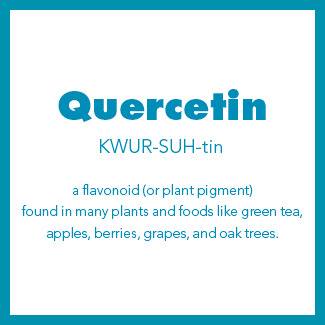LEAD DOG DESIGNS
|
Using Quercetin For Dogs With Allergic Inflammation
By Margit Maxwell SIDE NOTE: DO NOT GIVE GRAPES OR RASINS TO DOGS!! There are many kinds of inflammation that can occur in dogs. One kind of inflammation is the allergic response to something in the environment or to something that has been ingested. Do you have a dog who gets an itchy, hot, inflamed allergic response to things in his environment? Chances are really good that the Vet recommended that you give Benadryl to your dog. Do you worry about having to give Benadryl to your dog often? The active ingredient in Benadryl used to block histamine is diphenhydramine and frequent use of this drug can cause issues with liver function in dogs. So what if there were a natural alternative to using Benadryl for your dog's allergic inflammation? Quercetin The flavonoid, Quercetin, is a plant based natural compound found in the peel of common fruits and vegetables like citrus fruits, apples, grapes, dark cherries, dark berries, onions, and parsley. It also occurs naturally in some teas and red wine. This flavonoid has powerful anti-oxident, anti-histamine, and anti-inflammatory properties that help to quiet the inflammation caused by an allergic response without the harsh chemicals of over the counter allergy medications. What Is An Allergic Reaction? Simply, an allergy is an inflammatory response to an immune system reaction. When the body reacts to an allergen, the immune system mounts an attack on the invading force by producing antibodies. These antibodies cause cells to release chemicals, like histamine, into the bloodstream. The histamine then causes an inflammation in the skin, eyes, or in the mucosa of the respiratory tract. This is why it is not uncommon to see dogs who are having allergic reactions to chew, lick, or scratch at itchy body parts. Quercetin can address the inflammatory response by turning off the histamine production and can control the inflammation process by actually inhibiting the production of certain inflammatory molecules. Using The Supplement Quercetin Quercetin supplements are often combined with the enzyme, Bromelain, to help increase the bioavailability of the Quercetin. Bromelain is an enzyme that also helps to inhibit the production of histamine. Together, these two products help to suppress certain types of pain and inflammation associated with the allergic responses of the body. Dosages Most Quercetin comes in doses of 1000 mgs which is meant for the average 125 pound human being. The daily dosage for dogs is as follows: 1000 mgs, for dogs 125 pounds, 800 mgs for dogs 100 pounds, 600 mgs for dogs 75 pounds, 400 mgs for dogs 50 pounds, 250 mgs for dogs 35 pounds, 125 mgs for dogs 15 pounds. Whenever possible split daily doses into two equal doses for a more even supply of Quercetin into the bloodstream. Do not over dose your dog as very high doses have Quercetin may damage kidneys. Cautions Do not give Quercetin to dogs who are known to have kidney disease or who are pregnant. It is not advisable to give Quercetin on a long term basis. Usually the rule of thumb is for every 6 weeks on the supplement allow for 3 weeks off the supplement. Also, if you know that your dog will require surgery stop giving Quercetin 14 days in advance of the surgery. Don't Just Guess, Get Professional Medical Guidance As with all supplements, to keep your dog safe make sure that you ask a qualified medical person about how to safely use this supplement for your dog.
1 Comment
Leave a Reply. |
AuthorMargit Maxwell- A Dog Trainer (CPDT) and Canine Behaviour Specialist for The Divine Dog Project. She lives in Calgary, Alberta, Canada with her Herd of two Siberian Huskies (Kaya and Angel) and an Alaskan Malamute (Skylar). She also has credentials in Psychology (Human and dog), Animal Sciences, Natural Medicine, Energy Medicine, and many alternative Healing Modalities. Archives
February 2021
Categories
All
|
Shop |
Company |


 RSS Feed
RSS Feed
